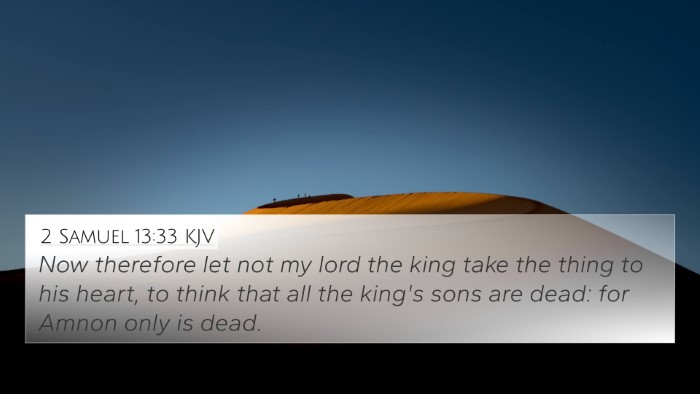Understanding 1 Samuel 25:25
Verse: "Let not my lord, I pray thee, regard this man of Belial, even Nabal: for as his name is, so is he; Nabal is his name, and folly is with him: but I thine handmaid saw not the young men of my lord, whom thou didst send." - 1 Samuel 25:25 (KJV)
Summary of Insights
The verse stands in the context of Abigail's plea to David regarding her husband Nabal. Her wise words reflect a deep understanding of Nabal's character and the folly of regarding his insults. This passage is rich with themes of wisdom, folly, and the implications of one's name and character.
Commentary Insights
- Matthew Henry's Commentary:
Henry emphasizes Abigail's discernment in recognizing Nabal's true character as a "man of Belial," or a worthless fellow. He points out that Abigail, in her plea to David, contrasts herself with her husband's folly, showing her wisdom and humility. Her words suggest that Nabal’s name and behavior reflect his true nature, and she seeks to distance herself from his actions. This anticipates the eventual fall of Nabal, highlighting the Lord's justice.
- Albert Barnes' Notes:
Barnes notes that Nabal’s name, which means "fool," is indicative of his foolishness and limitations. His refusal to acknowledge David's authority is portrayed as an affront that could lead to dire consequences. Abigail's intervention is significant as it underscores the importance of wise actions in confronting foolishness. Barnes highlights Abigail's representative role as she takes on the concerns and aspirations of her household as intercessor.
- Adam Clarke’s Commentary:
Clarke discusses the culture of the time which made Nabal's behavior particularly contemptible, illustrating how family names carried reputational weight. He praises Abigail's shrewdness, as she recognizes the potential calamity that Nabal’s actions could incur. Clarke notes that her humility and acknowledgment of her husband's faults reflect true wisdom, serving as a model for all. Abigail’s foresight in not aligning with Nabal’s folly serves to save her household.
Bible Cross-References
1 Samuel 25:25 relates to several Bible verses, which illuminate the themes of folly, wisdom, and intercession:
- Proverbs 12:15 - "The way of a fool is right in his own eyes: but he that hearkeneth unto counsel is wise."
- Proverbs 14:1 - "Every wise woman buildeth her house: but the foolish plucketh it down with her hands."
- Proverbs 17:12 - "Let a bear robbed of her whelps meet a man, rather than a fool in his folly."
- Proverbs 18:2 - "A fool hath no delight in understanding, but that his heart may discover itself."
- 1 Samuel 25:3 - "Now the name of the man was Nabal; and the name of his wife Abigail: and she was a woman of good understanding, and of a beautiful countenance: but the man was churlish and evil in his doings."
- 1 Samuel 25:39 - "And when David heard that Nabal was dead, he said, Blessed be the Lord, that hath pleaded the cause of my reproach from the hand of Nabal, and hath kept his servant from evil; for the Lord hath returned the wickedness of Nabal upon his own head."
- 2 Samuel 16:7 - "And thus said Shimei when he cursed, Come out, come out, thou bloody man, and thou man of Belial."
Thematic Connections
This verse connects broader biblical themes, particularly focusing on:
- The Nature of Folly: The Bible frequently contrasts wisdom and folly, urging believers toward the former as depicted in Proverbs.
- Intercession and Mediation: Abigail’s role highlights the value of mediators, paralleling other biblical figures like Moses (Exodus 32:11-14) and Jesus as our Advocate (1 John 2:1).
- Character and Reputation: The importance of a name and how it reflects one’s actions is recurrent throughout scripture.
Conclusion
In conclusion, 1 Samuel 25:25 offers profound insights into character, the dynamics of wisdom vs. folly, and the power of intercession. Abigail’s wisdom stands in sharp contrast to Nabal’s folly, serving as a timeless lesson on the value of discernment and the impacts of one's choices.







